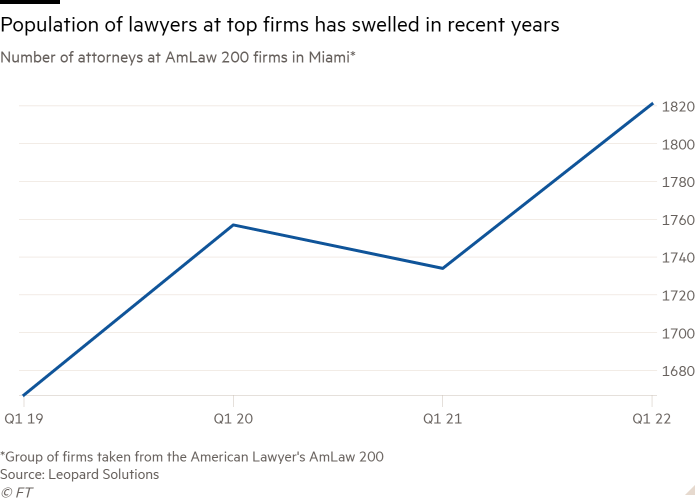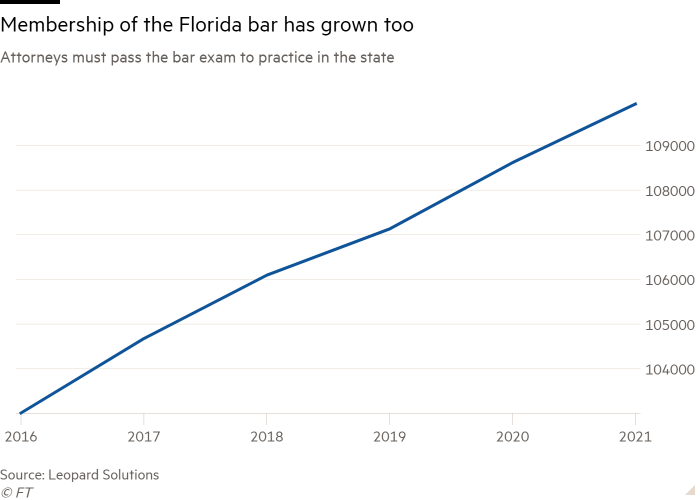Miami becomes the new boom town for corporate lawyers
Since US law firm Kirkland & Ellis announced it was setting up shop in Miami, private equity partner Jeremy Liss has found himself very popular with his colleagues.
The 49-year old is trading the windy city of Chicago for South Florida heat to run Kirkland’s new outpost and has been fielding calls from lawyers keen to join him ever since.
“The initial demand has been extremely strong. It’s probably even stronger demand than we had anticipated,” he said. “[Miami] is the hot place in the US . . . It’s becoming Wall Street south.”
Kirkland is one of a number of firms expanding to Miami to capitalize on a mass migration accelerated by the coronavirus pandemic. In the year to July 2021, more Americans moved to Florida than any other state — 220,890 of them, according to census data. The influx included billionaires and hedge funds unmoored from their Wall Street offices who flocked to South Florida for its low taxes and year-round sunshine.
In June, billionaire hedge fund manager Ken Griffin said he was moving his firm Citadel from Chicago to Miami due to rising crime rates, calling the Florida city “a growing metropolis that embodies the American dream”. Carl Icahn moved his hedge fund office from New York to Miami during the pandemic, and Blackstone announced it was opening an office there in 2020. Venture capitalists David Blumberg and David Sacks are among those who have spent millions on waterfront homes on Miami Beach.
The lawyers soon followed. In May, Kirkland, the world’s highest-grossing law firm, announced it was setting up shop in Miami with lawyers moving from Chicago and New York. Winston & Strawn opened its own base in May, and King & Spalding is set to move in too.
“In the last 10 years international law firms have dipped their toe into the South Florida pool, but now people are diving in headfirst . . . It’s an irrevocable shift,” said Joe Ankus, a Miami-based recruiter with 30 years’ experience in the market.
Lawyers once flew into Miami mainly to work on deals with a Latin American focus and flew out again. But the city has become a new hub for tech and private equity.
“The economy was doing really well [pre-pandemic] and there was an increase in the developing technology and private equity groups springing up in South Florida. Then the pandemic created this desire to be in the open air and not encased in concrete,” said Ankus. “It led to a lot of north-easterners with ties to the tech and venture capital world looking at Miami as an opportunistic move.”
Enrique Martin, an M&A lawyer and South Florida natively hired this year to lead Winston & Strawn’s new office, said: “In the past Miami was seen as a gateway — somewhere you’d stop on the way to somewhere more important.
“Now it is a destination that has attracted significant pools of capital.”
Low tax and lifestyle
The ranks of lawyers are swelling rapidly in South Florida as a result, populating Miami’s Brickell neighborhood in the heart of the financial district.
The number of attorneys in Miami across the top 200 firms exceeded 1,800 at the start of 2022, up from around 1,660 at the start of 2019, according to data from Leopard Solutions. Across Florida, the top firms added almost 200 partners to their ranks over that two-year period.

Recent movers include litigation specialist Quinn Emanuel Urquhart & Sullivan, which hired lawyer and Miami major Francis Suarez to launch its new office last year along with nine other lawyers. The firm said the Miami office was its biggest opening.
Suarez is a crypto fan — he has said that he takes his majoral salary in bitcoin — and has promised favorable regulation for crypto companies moving to Miami. Last year, the city event launched its own cryptocurrency, MiamiCoin, which has since lost almost 100 per cent of its value.
Tom Lauria, a White & Case lawyer, has lived in Miami since the 1990s. His three decades of experience as a top US corporate bankruptcy lawyer based in Miami means he regularly fields calls from rival national law firms who want him to mentor attorneys setting up shop in Florida.
“I moved to Miami in 1992 and . . . it became the perfect place for me. On the one hand, I’m in the same timezone as New York and it’s a two-hour flight. But then when I am done, I can look in the rear-view mirror and get back to Miami.” Lauria lives on exclusive Fisher Island and cites the lifestyle and low taxes as attractions for him.
Law firms are split between those parachuting lawyers from other states into Miami offices when they are needed, and those like Winston & Strawn, hiring established partners already working in the region.

Martin, who returned to Miami in the early 1990s after law school and college, said Winston & Strawn is aiming to build out its expertise in complex commercial litigation, private equity and blockchain.
“Miami has always been known for its beaches and its sun,” he said. “But there was a time when it was really limited to that. The 1980s were difficult times in terms of public perception — the Miami Vice era, when much of the business being conducted involved the drug trade.
“I was in high school during those years so I’m excited about what Miami has become.”
Real estate and Wall Street knowhow in demand
A boom in US M&A last year and a growing number of blockbuster real estate transactions in Florida have also pushed up lawyers’ rates and driven a fierce battle for staff.
“We’re seeing a trend towards hourly rates [that] routinely eclipse $1,000 an hour, which the Miami market did not used to have, and requirements [that lawyers have] books of business well past $1mn,” said Ankus.
“We have anywhere from five to eight times as many [vacant] positions as qualified candidates,” he added. “We’re getting called 10 times a month by law firms and corporations asking if we have anyone. We’ve resorted to telling them we don’t have any more purple unicorns today.”
The most in-demand lawyers are those who specialize in real estate, because of a surge in big property deals, and those with Wall Street experience. “It’s a really good day if we get a call from [a lawyer who qualified] in Florida, who grew up down here, cut their teeth on Wall Street and wants to come home,” said Ankus.
As finance businesses and the lawyers have arrived in Miami, office space has also become harder to find. “Properties were flying off the shelf, there was nothing available,” said Quinn’s John O’Sullivan. “We’d look at a list of available spaces and within hours, half of them would be gone.”
One lawyer said that even with the recent growth of finance and crypto, Miami was not nearly as important as New York, Chicago or Los Angeles and that litigators were better off living near major courthouses.
But Kirkland and other firms say they are already fielding calls from partners and associates keen to trade in New York or Chicago weather for Miami’s climate.
Liss said: “We think there are tonnes of talented lawyers here today as well as lawyers across the country who are talented and would prefer to live in South Florida.”
“To folks coming from north-east and California, Florida still looks like a bargain,” commented Ankus. “Lawyers are realizing it’s a great climate . . . and are thinking: I just sold my house in New York for $3.8mn and I can buy a nice house for $1.6mn, why didn’t I do this sooner?”